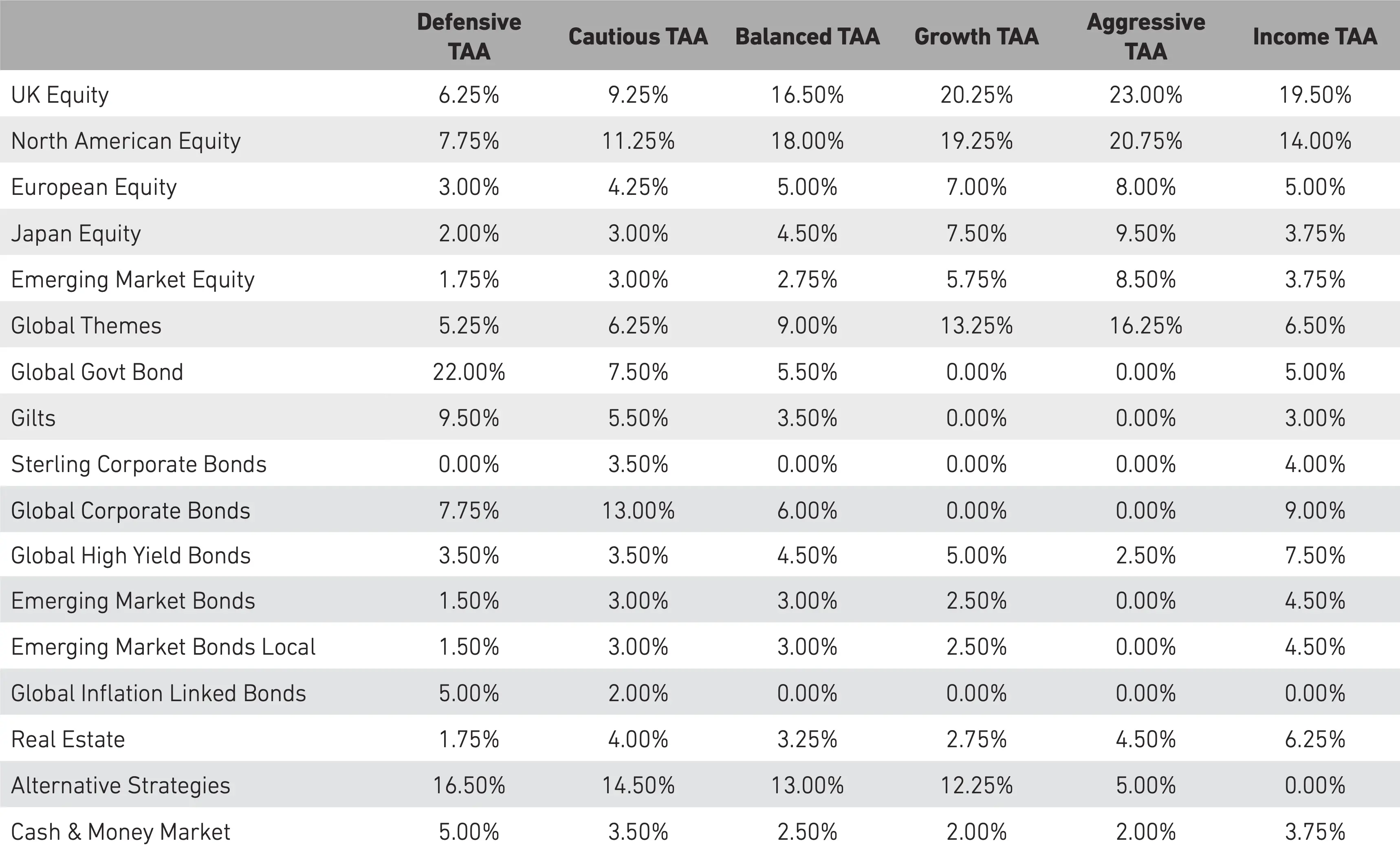
Monthly commentary
Portfolio Performance
At 7IM, we believe that taking a long-term view is essential when investing. We can’t always avoid the shortterm bumps and shocks that the financial world has in store, but a well-diversified portfolio goes a long way towards smoothing out some of the journey. The long-term nature of our strategic and tactical process is a good complement to the Succession Matrix Expected Parameters.

Source: 7IM/FE. Annualised return is defined as ‘Ann. Return’ in the performance table above and is as at end FEBRUARY 2024. Market returns have been poor in absolute terms since the beginning of 2020 with the Covid pandemic and then the inflationary shock of 2022. While portfolios have held up well relative to peers, the 3 and 5 year absolute returns are lower than average, even though the since inception longer term numbers are in line with expected parameters.
Summary
February is usually a breath of fresh air after a festive December gives way to what’s arguably the longest month of the year.
And in February, sentiment continued to be upbeat. In the US, the Superbowl was not the only event breaking records. The S&P 500 brought excitement to the financial markets when it hit 5,000 for the very first time. The index, which is up ~28% in a year to February, has continued its upwards trend, carried mostly by concentrated growth of the Magnificent Seven stocks. While there are other things going on in the world, all attention was on corporate earnings. Goldman Sachs even referred to Nvidia as “the most important stock on planet earth”, and the chip manufacturer exceeded already high earnings expectations - reminding us all that AI will be with us for some time.
The Nvidia story shared some of the limelight with Japan, where the Nikkei reached a new all-time high. While this was likely driven by rising profits, those profits are being driven by ongoing currency weakness. This weakness persists as investors question how high interest rates will go. The Bank of Japan believes there are signs that inflation is returning to the country, but tread carefully.
In the UK, GDP estimates showed a 0.3% decline in the last quarter of 2023 (following a 0.1% contraction in the preceding period), translating into a 0.1% growth in the whole of last year. This news jumped to most national newspaper front pages, but omitting the critical word: “estimates”. There are large quantities of data points to enter the machine that produces the GDP figure, and with 40 days for the Office of National Statistics to produce this figure, it can only be an estimate. Regardless of what the definitive figure turns out to be, sentiment across the markets has been relatively stable, evidenced by the FTSE 100.
While the backdrop remains stable overall, we continue to be wary of an increasing portfolio of returns being driven by a smaller number of companies. Inevitably, returns will broaden to other markets, which is why we aim to make our portfolios ready for different environments.
Portfolio Positioning and Changes
We made the following tactical changes to portfolios in this quarterly rebalance:
- Small reduction in our Government Bond allocation, but remain overweight compared with our SAA.
- Reduction in our Healthcare Innovations position. This is a position we still like for the growth potential it adds to portfolios, but after positive returns this quarter, we are rotating into other parts of the market.
- Added some FTSE 250 exposure back into portfolios. Having favoured focussing on the larger cap FTSE 100 part of the UK market, this quarter, we moved some of this allocation back into the mid-cap space.
Core investment views
At 7IM, we have a number of long-term core views that help to guide our investment decisions and allocations within portfolios.
Over the next 12 months, we think that the global economy will slow down – prompting bouts of volatility. In this environment, it is important to rely on a stable identity. Economic uncertainty creates fear and investor sentiment tends to overreact to economic turning points. Going forward, we believe that:
- Inflation is coming down: Across the developed world, inflation has peaked, and is mostly falling. Supply-chain disruptions have eased, energy prices are a little more settled, and companies are no longer reporting issues with finding workers. Of course, slower inflation still means rising prices – so the cost of living pain isn’t going away quickly
- Interest rates are high: We’re now over a year into the rate hiking cycle. Interest rates are unambiguously high when compared with the past decade. The impact of higher rates is always the same – although time-to-effect changes in every cycle
- The economy is slowing: For consumers and companies, day-to-day life is getting harder – whether it’s rising costs or increased debt, there’s less money left at the end of the week or month. As the flow of money around the economy slows, strong growth is more difficult to achieve. The world may or may not slip into a ‘technical’ recession in the next three months, but a sluggish growth environment is already here.
Sluggish and sideways… In an environment with lots of uncertainty and a lack of confidence, we want to make sure portfolios are insulated against shocks, while still generating sufficient returns to make investing worthwhile. And we think our portfolios are set up to do just that.
There’s no one answer… When managing a diversified long-term portfolio, there shouldn’t be a single ‘big’ call. For an outlook that calls for selectivity, especially in the medium and short term, we’re finding lots of different opportunities – both to protect capital and to grow it.
Asset allocation
Detailed asset allocation

Source: 7IM

You can download the commentary as a PDF here.




